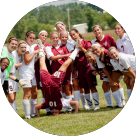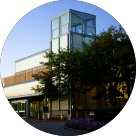Recently Visited Pages
Take advantage of this at-a-glance look at the pages on the SCC website you most often visit. Use this as a tool to navigate quickly to info you need the most. Take it one step further and click the star in the top right corner to ensure your favorite pages remain on your list of Visited Pages.
Computer Use Policy
Conduct for Computer Use
St. Charles Community College computing resources are available for use by authorized persons including administrators, faculty, staff and students of the college. Each user shall act in an ethical manner consistent with the stated goals and Information Technology (IT) mission of St. Charles Community College. Each user is responsible for his/her use of computing resources. The college has the responsibility to provide appropriate security, to maintain reliability and data integrity and to enforce this policy. The college prohibits any unauthorized use of computer resources.
St. Charles Community College monitors the use of computer workstations to enforce compliance with the standards listed below.
Children too young to be admitted to the college are not allowed access to SCC computers without supervision. In addition, children (supervised or unsupervised) are not allowed in the ACE Center or TECH 116 computer labs.
Unauthorized Uses of Computer or Network Resources
Include, but are not limited, to:
- Use that violates any federal or state law.
- Unauthorized access to college files, other user files, or any protected and private computer resources (including remote computer systems).
- Copying, revising, damaging, removing or distributing college programs or data (including software) or any other user’s programs or data without the expressed permission of the owner of the software or files.
- Activities that disrupt normal computer/network use and services; or those that are wasteful of computing resources. Such disruptions include but are not limited to:
- Propagation of computer viruses.
- Violation of personal privacy.
- Unauthorized access to protected and private network resources.
- Sending mass e-mails or chain letters.
- Unnecessary printing or other network traffic.
- Damaging or altering college computer equipment or supplies.
- Use that is harmful or harassing to other users.
- Introduction of any unacceptable information onto the administrative or academic systems and applications. Unacceptable types of information include:
- Information that infringes on the rights of others.
- Information that is abusive, profane or sexually offensive.
- Information that may injure another or lead to a lawsuit; such as pirated software, destructive software (including computer viruses), pornographic or libelous statements or unauthorized copies of licensed software.
- Advertisements for commercial enterprises.
- Games or other software programs not approved by one of the TRP technology directors or by the dean of learning resources for library computers.
- Unauthorized use of college computing resources for personal or monetary gain.
- Access to SCC’s network resources via any unauthorized device without prior permission from the Network Computing Department or Academic Computing Department.
- Unauthorized devices are those that are not owned by the college.
- Violation of regulations as stipulated in the Family Education Rights and Privacy Act as amended in 1974 (Buckley Amendment1.)
- The use of peer-to-peer file sharing applications to gather or distribute copyrighted media files.
- Use of SCC’s network resources is subject to the Acceptable Use Policy of our Internet provider, MoreNET. It can be found at the following URL: https://www.more.net/content/service-policies.
Misuse of college computing resources or failure to adhere to SCC’s Computer Security Policies, guidelines and procedures by administrators, faculty, staff or students is subject to disciplinary action and may result in dismissal from the college. Violation of U.S. or Missouri laws may result in legal action.
SCC will fully cooperate with the Recording Industry Association of America (RIAA) and the Motion Picture Association of America (MPAA) regarding any copyright issues pertaining to their intellectual properties.
1The Buckley amendment states that no personally identifiable information in education records other than “directory information” be released to third parties without written consent of the student. Requests for any information regarding a student including directory information should only be processed by the Admission and Records Office.








